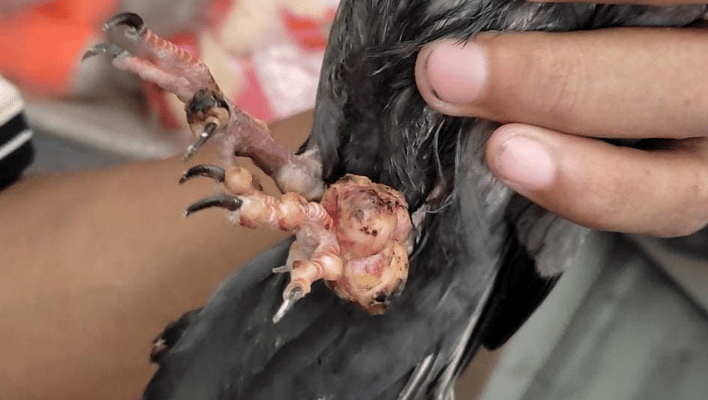Lovebirds are among the most adored bird species in the entire world because of their devoted, friendly, and playful personalities. A variety of species, including Agapornis roseicollis, Agapornis personata, Agapornis Liliana, and Agapornis fischeri, have recently gained popularity as pets all around the world. Unfortunately, lovebirds are susceptible to illnesses like Avian pox, a virus that affects various bird species and is brought on by a member of the Poxviridae family.
Pox can cause lesions, growths that resemble warts, and other symptoms in birds that affect their skin, mucous membranes, and respiratory system. In some circumstances, the illness can be fatal, particularly in young or immunocompromised birds.
Prevention is better than cure
“The viral illness known as “avian pox” can harm your beloved bird and result in symptoms like skin growths, respiratory problems, and even death. Direct contact with infected people or contaminated materials can spread the virus, which is very contagious. Practice proper cleanliness, isolate new birds, and seek veterinary care if you feel your bird is diseased if you want to safeguard your birds from this potential threat. You can keep your birds healthy and content by giving them the right attention and care.”
Table of Contents
What is Pox?
Different bird species, including farmed poultry and wild birds, are susceptible to the viral disease known as avian pox. The virus is extremely contagious, and contact with infected birds or contaminated surfaces is the main way it spreads. The virus can also transmit between birds through the bites of blood-sucking insects like mites and mosquitoes. Pox can cause lesions, growths that resemble warts, and other symptoms in birds that affect their skin, mucous membranes, and respiratory system. Sometimes, especially in young or immunocompromised birds, it can be lethal.

How is the pox spread?
Direct contact with diseased birds, contaminated surfaces, or blood-sucking insects like mosquitoes and mites that can transport the virus between birds are all ways that the pox virus is spread.
Pox prevention
Keeping cages and equipment clean and sanitized on a regular basis will help to prevent the pox. To support the bird’s immune system, it’s also critical to offer a healthy diet and clean water to drink. Insecticides or mosquito nets should also be used to stop the transmission of the virus by blood-sucking insects. Additionally, you ought to keep your birds away from wild birds that can be infected.
Symptoms of Pox
Pox may manifest as sores on the skin or mucous membranes, wart-like growths on the skin, beak, or feet, respiratory distress, decreased appetite, and weight loss. If ignored, these symptoms may become serious and result in your bird’s death.
Preventing Pox
Maintaining excellent hygiene requires routinely washing and sanitizing cages and other equipment in order to prevent the pox. While mosquito nets or insecticides can stop the spread of the virus via blood-sucking insects, a balanced diet and clean water can assist the bird’s immune system. Additionally, it’s crucial to keep your lovebirds away from wild birds that can be infected.
Treatment for Pox
Isolate the bird if you think it may have pox to stop the virus from spreading. It is crucial to offer supportive care, such as a healthy diet and clean water to drink. Aviterium Pox O drops are a well-known homoeopathic combination for treating lovebird pox. Additionally, you should keep things clean by routinely cleansing cages and other equipment and bolstering the bird’s immune system with insecticides or mosquito netting.
Conclusion
As a responsible pet owner, it is crucial to take steps to prevent and treat pox in lovebirds. Regular cleaning and disinfecting of cages and equipment, providing a balanced diet and clean drinking water, and using mosquito nets or insecticides are crucial to preventing the spread of the virus. If your lovebird shows symptoms of pox, isolate the bird immediately and provide supportive care, including using Aviterium Pox O drops to treat the disease.
Frequently Asked Questions
What is pox?
pox is a viral disease that can affect various bird species, including lovebirds. It is caused by a member of the Poxviridae family and is highly contagious.
What are the symptoms of avian pox in lovebirds?
Lovebirds with avian pox may develop wart-like growths on the skin, beak, or feet, lesions on the skin or mucous membranes, respiratory distress, and decreased appetite and weight loss.
How can pox in lovebirds be treated?
Treatment of pox in lovebirds involves isolating infected birds to prevent the spread of the virus, providing supportive care such as a balanced diet and clean drinking water, and using homeopathy combinations such as Aviterium Pox O drops. It is also essential to keep the environment clean by regularly cleaning and disinfecting cages and equipment and to boost the bird’s immune system with mosquito nets or insecticides.
How can avian pox in lovebirds be prevented?
Preventing avian pox in lovebirds involves maintaining good hygiene by regularly cleaning and disinfecting cages and equipment, providing a balanced diet and clean drinking water to help boost the bird’s immune system, and using mosquito nets or insecticides to prevent blood-sucking insects from spreading the virus. It is also crucial to isolate sick birds to prevent the spread of the virus and to keep lovebirds away from wild birds that may be carriers of the disease.
Sources:
- “Avian Pox.” Merck Veterinary Manual, Merck & Co., Inc., 2021, www.merckvetmanual.com/poultry/avian-pox/overview-of-avian-pox.
- “Avian Pox in Birds.” Animal Health Australia, Australian Government, Department of Agriculture, Water and the Environment, 2021, www.animalhealthaustralia.com.au/animal-diseases/avian-pox/.

